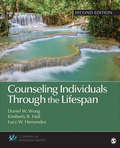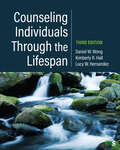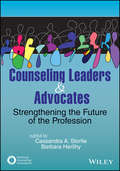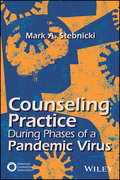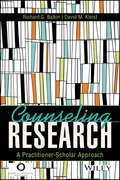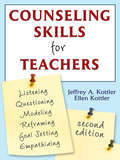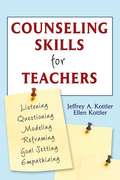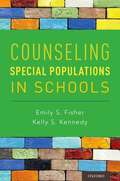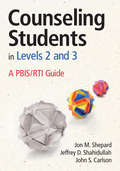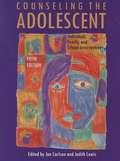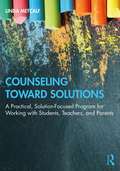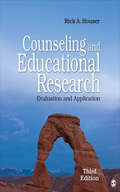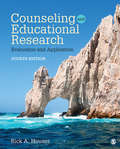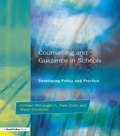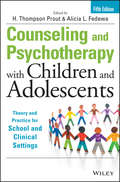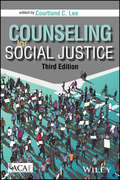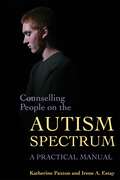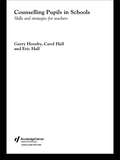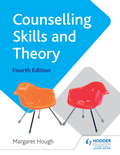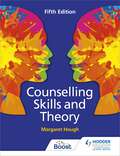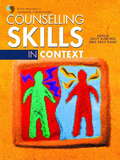- Table View
- List View
Counseling Individuals Through the Lifespan (Counseling and Professional Identity)
by Kimberly R. Hall Daniel W. Wong Lucy Wong HernandezOrganized around the 2016 Council for Accreditation of Counseling and Related Educational Programs (CACREP) Standards, Counseling Individuals Through the Lifespan introduces readers to the fundamentals of the counseling process during each stage of human development. Topics such as the client-counselor relationship, counseling theory, research, and interventions are addressed with a focus on caring for the total person within their environment and culture in today’s diverse world. Emphasizing the importance of self-reflection, chapters include case illustrations and guided practice exercises to further the development of successful, ethical 21st century counselors. Included with this title: The password-protected Instructor Resource Site (formally known as SAGE Edge) offers access to all text-specific resources, including a test bank and editable, chapter-specific PowerPoint® slides.
Counseling Individuals Through the Lifespan (Counseling and Professional Identity)
by Kimberly R. Hall Daniel W. Wong Lucy Wong HernandezOrganized around the 2024 CACREP Standards, Counseling Individuals Through the Lifespan introduces students to the fundamentals of the counseling process during each stage of human development. Topics such as the client-counselor relationship, counseling theory, research, and interventions are addressed with a focus on caring for the total person within their environment and culture. Emphasizing the importance of intentionality and self-reflection, the chapters include case illustrations and guided practice exercises to further the development of successful 21st century counselors. The Third Edition has been revised to include important issues associated with COVID-19 and the aftermath, trauma caused by the loss of family members, significant others, and family pets, and the impact of artificial intelligence.
Counseling Individuals Through the Lifespan (Counseling and Professional Identity)
by Kimberly R. Hall Daniel W. Wong Lucy Wong HernandezOrganized around the 2024 CACREP Standards, Counseling Individuals Through the Lifespan introduces students to the fundamentals of the counseling process during each stage of human development. Topics such as the client-counselor relationship, counseling theory, research, and interventions are addressed with a focus on caring for the total person within their environment and culture. Emphasizing the importance of intentionality and self-reflection, the chapters include case illustrations and guided practice exercises to further the development of successful 21st century counselors. The Third Edition has been revised to include important issues associated with COVID-19 and the aftermath, trauma caused by the loss of family members, significant others, and family pets, and the impact of artificial intelligence.
Counseling Leaders and Advocates: Strengthening the Future of the Profession
by Barbara Herlihy Cassandra A. StorlieThis text challenges readers to reflect on what they want to accomplish in their own careers and offers a behind-the-scenes look at becoming an effective leader and advocate. The authors provide information essential to the growth and development of counseling leaders and give newer professionals a clearer sense of what leadership and advocacy look like on the job. After a current perspective on what ethical and culturally responsive leadership entails, 13 counseling leaders—both long established and emerging and representing a wide range of cultural and intersectional backgrounds—share their unique stories in poignant personal profiles. The final section of the text highlights pertinent themes in the profiles and explores implications to strengthen the future of the profession. *Requests for digital versions from ACA can be found on www.wiley.com *To purchase print copies, please visit the ACA website here *Reproduction requests for material from books published by ACA should be directed to permissions@counseling.org
Counseling Practice During Phases of a Pandemic Virus
by Mark A. StebnickiThe coronavirus pandemic is a historical trauma that lives in the mind, body, and spirit of humankind and, as such, requires a reconceptualization of how to effectively counsel individuals, families, communities, and underserved populations now and in the years to come. This foundational book addresses the medical, physical, mental, behavioral, and psychosocial health needs of adults, adolescents, and chilren as they experience increases in anxiety, depression, stress, substance use disorders, and suicidality due to the pandemic. Dr. Mark Stebnicki's pandemic risk and resiliency continuum theoretical model introduces clinical practice guidelines for assessment, prevention, and treatment that increase opportunities for optimal health and wellness. *Requests for digital versions from ACA can be found on www.wiley.com *To purchase print copies, please visit the ACA website here *Reproduction requests for material from books published by ACA should be directed to permissions@counseling.org
Counseling Research: A Practitioner-Scholar Approach
by Richard S. Balkin David M. KleistThis introductory text for counselors-in-training and emerging researchers focuses on research methodology, design, measurement, and evaluation. Richard Balkin and David Kleist explain the primary research methods used in counseling while emphasizing the importance of ethics and multicultural issues, demonstrating a professional counselor identity within the framework of research, and outlining the specific approaches used to inform counseling practice. The book contains four parts: The Essence of Research in the Counseling Profession, Quantitative Research Designs, Qualitative Research Designs, and Practice-Based Research. <p><p> Key features include case examples that bridge the technicalities of research and the realities of practice; strategies for designing research; guidelines for counselors considering topics for a thesis, a dissertation, or the development of an initial study; examples of current counseling research articles; and suggested activities to enhance understanding of the material in each chapter and facilitate classroom discussion.
Counseling Skills for Teachers
by Ellen Kottler Dr Jeffrey A. KottlerThis updated edition expertly guides teachers to be effective helpers when called upon to respond quickly and appropriately to students' interpersonal, social, and emotional needs.
Counseling Skills for Teachers
by Jeffrey A. Kottler Ellen KottlerBy necessity, today's teachers do much more than deliver instruction. In the classroom, on the playground, or even in the parking lot, teachers are often called upon to respond quickly and appropriately to students' social and emotional needs, drawing from instinct more than anything else. In this second edition of the bestselling Counseling Skills for Teachers, Jeffrey and Ellen Kottler expertly guide preservice and inservice teachers to be effective helpers in the context of today's most common challenges, highlighting issues related to homelessness, grief and loss, and bullying and harassment. The book also discusses: - Responding to a range of behaviors in formal and informal school settings - Building a culture of tolerance and respect in the classroom - Motivating disengaged students - Communicating effectively with counseling professionals and parents With an entirely new chapter on "Counseling Yourself," the book offers teachers surefire techniques for taking better care of themselves and the students in their schools.
Counseling Special Populations in Schools
by Emily S. Fisher Kelly S. KennedyCounseling Special Populations in Schools provides school-based mental health professionals with practical, specific strategies for counseling special populations of students who are at risk for academic, social, emotional, and behavioral problems in school. These special populations include students who are homeless, living in foster care, involved with the juvenile justice system, LGBTQ, pregnant or parenting, gifted, in military families, at-risk for school failure and dropout, and impacted by incarcerated parents. Each chapter focuses on one group of students, highlighting critical background information and providing evidence-informed counseling approaches and strategies to promote resilience and support student development. Chapters provide specific information about how to use basic counseling skills, as well as more advanced counseling techniques such as Solution-Focused Brief Therapy, Cognitive Behavioral Therapy, and Motivational Interviewing, to address the needs and challenges of these special populations of students. This advanced-level counseling book is an excellent resource for mental health professionals and graduate students who want to be able to provide effective counseling services for all students.
Counseling Students in Levels 2 and 3: A PBIS/RTI Guide
by Jon M. Shepard Jeffrey D. Shahidullah Dr John S. CarlsonTarget interventions to the students who need help the most! How do you make counseling effective and efficient when both counselors and students are pressed for time? The answer: by identifying and working with students who are most in need of counseling services through a PBIS/RTI framework. This user-friendly guide presents three counseling approaches designed to work at levels 2 and 3 of the PBIS and RTI frameworks. Here you’ll find: Evidence-based interventions and counseling best practices Guidance on successful implementation within a PBIS/RTI framework Forms and resources to help busy professionals Case studies, vignettes, and practical examples
Counseling The Adolescent: Individual, Family, And School Interventions. 5e
by Jon Carlson Judith A. LewisAddresses the important issues related to adolescence. This book provides practical intervention strategies and methods, and material on resilience in children, causes of bullying, school violence, conflict resolution, ethics, and more. It emphasis on partnerships of school, community, and agencies; and covers changes in counseling practice.
Counseling Toward Solutions: A Practical, Solution-Focused Program for Working with Students, Teachers, and Parents
by Linda MetcalfThis book provides a solution-focused approach to working alongside students, parents, and teachers that decreases misbehaviors, encourages mental health and growth mindset in students, and provides social emotional learning opportunities. Grounded in the notion that focusing on problems often leads to frustration when tried and true remedies fail, the book provides an efficient and simple three-step approach to having solution-focused conversations with students, parents, and in response to intervention (RTI) and team meetings. This systemic approach enlists the client rather than the counselor to conjure a preferred plan for success, consequently reducing future counseling visits and promoting independent success in students. Each chapter includes a specific topic that was developed from the issues and situations faced by school counselors today, including consideration for working with all students, including LGBTQ students, and those with traumatic experiences or substance abuse. Complete with specific dialogues for students of all ages, and case studies, this text provides school counselors with a road map to looking beyond problems and seeking solutions with students, creating grit and resilience.
Counseling and Educational Research: Evaluation and Application
by Rick A. HouserThe Third Edition of Counseling and Educational Research: Evaluation and Application emphasizes the importance of being a good consumer of research and teaches readers how to conduct research in practice. Written in an engaging, conversational tone, the book uses concrete examples from professional literature to demonstrate how to effectively evaluate and interpret research articles—without relying on discipline-specific jargon. The Third Edition features new examples, updated research, a new chapter on single-subject research, a new chapter on the use of technology and research, and much more.
Counseling and Educational Research: Evaluation and Application
by Rick A. HouserThe Third Edition of Counseling and Educational Research: Evaluation and Application emphasizes the importance of being a good consumer of research and teaches readers how to conduct research in practice. Written in an engaging, conversational tone, the book uses concrete examples from professional literature to demonstrate how to effectively evaluate and interpret research articles—without relying on discipline-specific jargon. The Third Edition features new examples, updated research, a new chapter on single-subject research, a new chapter on the use of technology and research, and much more.
Counseling and Educational Research: Evaluation and Application
by Rick A. HouserCounseling and Educational Research: Evaluation and Application prepares readers to be good consumers and evaluators of research. Using concrete examples from published articles, author Rick A. Houser teaches students to take a systematic approach to evaluating professional literature critically and using it responsibly. The Fourth Edition covers evidence-based research, qualitative methods, program evaluation, and mixed methods; includes new discussions on how national accreditation standards in counseling (CACREP) and education (CAEP) apply to research; and examines how cultural influences can affect the research process.
Counseling and Educational Research: Evaluation and Application
by Rick A. HouserCounseling and Educational Research: Evaluation and Application prepares readers to be good consumers and evaluators of research. Using concrete examples from published articles, author Rick A. Houser teaches students to take a systematic approach to evaluating professional literature critically and using it responsibly. The Fourth Edition covers evidence-based research, qualitative methods, program evaluation, and mixed methods; includes new discussions on how national accreditation standards in counseling (CACREP) and education (CAEP) apply to research; and examines how cultural influences can affect the research process.
Counseling and Guidance in Schools: Developing Policy and Practice
by Colleen McLaughlin Meryl Chisholm Pam ClarkFirst Published in 1996. Routledge is an imprint of Taylor & Francis, an informa company.
Counseling and Psychotherapy with Children and Adolescents
by H. Thompson Prout Alicia L. FedewaA comprehensive, theory-based approach to working with young clients in both school and clinical settingsCounseling and Psychotherapy with Children and Adolescents, Fifth Edition provides mental health professionals and students with state-of-the-art theory and practical guidance for major contemporary psychotherapeutic schools of thought. Children and adolescents are not just small adults; they have their own needs, requirements, and desires, on top of the issues presented by still-developing brains and limited life perspective. Providing care for young clients requires a deep understanding of the interventions and approaches that work alongside growing brains, and the practical skill to change course to align with evolving personalities. The thoroughly revised fifth edition is a comprehensive reference, complete with expert insight.Organized around theory, this book covers both clinical and school settings in the fields of psychology, counseling, and social work. Coverage of the latest thinking and practice includes Cognitive Behavioral, Rational-Emotive, Reality Therapy, Solution Focused, Family Systems, and Play Therapy, providing a complete resource for any mental health expert who works with young people.Understand the major approaches to counseling and psychotherapeutic interventionsDiscover the ethical and legal implications of working with children and adolescentsLearn how to employ culturally responsive counseling with younger clientsExamine interventions for children and adolescents with disabilities and health care needsThis updated edition includes a stronger emphasis on the clinical application of theory to specific disorders of childhood and adolescence, and new coverage of the legal and ethical issues related to social media. Chapters include a case studies and online resources that make it ideal for classroom use, and new chapters on Solution-Focused Therapy and Play Therapy enhance usefulness to practicing therapists. Expert guidance covers techniques for working with individuals, groups, and parents, and explores the efficacy of the theories under discussion.
Counseling for Social Justice
by Courtland C. LeeThought leaders examine social justice counseling from a global perspective in the latest edition of this pioneering book. Part 1 examines the historical and contemporary context of social justice counseling. Part 2 presents ideas for promoting social justice and challenging oppression and marginalization with individual clients and communities. Topics in this section include perspectives on peace, violence, and conflict; recommendations for global initiatives in school counseling; advocacy for decent work; promoting gender equity; fighting racism; and implementing social action strategies with LGBTQ+ communities, older people, people with disabilities, and undocumented immigrants. Part 3 contains chapters on the role of neuroscience in advancing social justice and infusing social justice perspectives in ethics, research, and counselor training. "This third edition could not come at a better time given the current national and global political climates. Lee and his colleagues raise the bar, challenging counselors to move from simply understanding social injustice to engaging in actions that improve systemic inequities. The magnitude of this charge cannot be ignored. This text should be mandatory in every counselor education program in the United States and across the globe; the time is now. Counselors must take the lead by leaning in and changing the world one person at a time, one community at a time, and one nation at a time."—Colleen R. Logan, PhD, Fielding Graduate University "Courtland Lee continues to be a leader in helping to advance social justice in the counseling profession. This book builds on previous editions by offering new and emerging strategies for implementing social justice with clients and communities. It pushes the limits of what is possible when counselors incorporate social justice into their practice."—Manivong J. Ratts, PhD, Seattle University "This text provides crucial information on how counselors can engage in social justice work throughout their practice, research, and advocacy activities to not only become effective change agents but also transform how we see ourselves and the world."—Anneliese A. Singh, PhD, University of Georgia *Requests for digital versions from the ACA can be found on wiley.com. *To request print copies, please visit the ACA website here. *Reproduction requests for material from books published by ACA should be directed to permissions@counseling.org
Counselling People on the Autism Spectrum: A Practical Manual
by Katherine Paxton Irene EstayThe characteristics of autism spectrum disorders (ASD) present unique challenges, not only to people themselves affected, but also to counselling professionals. This manual provides counselling techniques that work not only for professionals, but also for individuals either coping with being on the spectrum themselves, or living with someone who has an ASD. Regardless of intellectual and linguistic ability, people on the autism spectrum often have significant impairments in emotional expression, regulation, and recognition, and they are known to have higher rates of depression and anxiety than the general population. This comprehensive book shows how to develop the tools necessary to help people on the spectrum cope with their emotions, anxieties, and confusion about the often overwhelming world that surrounds them. Illustrated with useful case studies, it covers a range situations where counselling may be helpful for individuals with ASD, both children and adults, families where a member is on the spectrum, and couples where a partner has ASD. It also addresses specific issues, including depression, anxiety, emotional regulation, social skills, and stress, with effective strategies for dealing with each issue. As well as being indispensable for counsellors, this book provides valuable information and advice for anyone working with people and families affected by ASDs.
Counselling Pupils in Schools: Skills and Strategies for Teachers
by Eric Hall Carol Hall Garry HornbyHow can teachers support children with emotional or social difficulties?Counselling Pupils in Schools is a comprehensive guide to the effective use of counselling in schools. It provides practical guidance for teachers and those responsible for pastoral care on how to develop counselling skills and intervention strategies. The book combines theory and research with practical classroom strategies designed to focus on the social and emotional development of students and their teachers. Topics covered include:* a model for counselling in school* skills and intervening strategies for teachers* cross-cultural and sensitive issues* peer counselling and support* empowering pupils and parents* classroom-based activitiesThe ethics of teacher-student relationships are also discussed and teachers are provided with ideas for collaboration and managing their own stress in order to be more effective in counselling and guidance.This book is relevant to all professionals who work with young people: Teachers, PSHE co-ordinators, SENCos, Education Welfare Officers and Educational Psychologists will find it particularly useful.
Counselling Skills and Theory 4th Edition
by Margaret HoughTrust this bestselling resource to provide you with the clearest introduction to the major approaches in counselling. Written by expert counsellor and bestselling author Margaret Hough, this textbook provides the clearest overview and introduction to the subject. It covers the major approaches to the field, how they interrelate and how you can put them into practice. Suitable for a wide range of qualifications from Foundation courses to Higher Education, it will help you to understand the nature of counselling, the skills you will need to develop and how to overcome the challenges you might face in this rewarding profession. This new edition, now in full colour, provides up-to-date research on topics such as ethics in counselling and the importance of both supervision and person-centred care in residential and hospital settings. - Navigate your way easily with the book's clear language and structure - Translate theory into practice with realistic case studies, exercises and other useful features - Develop your knowledge with extended coverage of cognitive behavioural therapy, Brief therapy and online counselling - Further your understanding with expanded coverage of working with younger clients, counselling for trauma and disaster and psychodynamic theories
Counselling Skills and Theory 5th Edition
by Margaret Hough Penny TassoniTrusted author Margaret Hough updates this bestselling resource that will provide you with the clearest introduction to the major approaches in counselling. Easy to read, clear and concise, this full colour updated edition will take you from learning to application with a variety of group tasks and case studies to explore and evaluate.- Explore the new extended sections on Cognitive Behaviour Therapy, Neuroscience, and Cultural Diversity and Counselling to highlight new approaches, developments and research.- Consolidate learning with new student exercises - now over 70!- Translate theory into practice with new case studies, including some that will illustrate the problems clients experienced during Covid-19, with special reference to emotional and psychological effects of lockdown- Understand the ways in which neuroscience helps us understand the beneficial effects of counselling and psychotherapy with the regular references throughout the book.
Counselling Skills and Theory 5th Edition
by Margaret Hough Penny TassoniTrusted author Margaret Hough updates this bestselling resource that will provide you with the clearest introduction to the major approaches in counselling. Easy to read, clear and concise, this full colour updated edition will take you from learning to application with a variety of group tasks and case studies to explore and evaluate.- Explore the new extended sections on Cognitive Behaviour Therapy, Neuroscience, and Cultural Diversity and Counselling to highlight new approaches, developments and research.- Consolidate learning with new student exercises - now over 70!- Translate theory into practice with new case studies, including some that will illustrate the problems clients experienced during Covid-19, with special reference to emotional and psychological effects of lockdown- Understand the ways in which neuroscience helps us understand the beneficial effects of counselling and psychotherapy with the regular references throughout the book.
Counselling Skills in Context
by Members British AssociationPublished in association with the BACUP, this textbook provides the required knowledge for counselling skills qualifications. The book relates to the activity of counselling skills and addresses the context and roles in which these skills are used. Each chapter of the book contains information and practical activities which are designed to test knowledge. The book offers comprehensive coverage of the following areas:? Ethics and processes, including the description of the difference between counselling skills and counselling. ? Life stages.? Theoretical perspectives.? Values, attitudes and beliefs.? Listening skills.? Settings.? Bullying and harassment.? Mentoring.The book is ideal for students on counseling skills courses and those using counseling skills in a variety of different environments.
